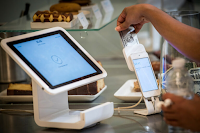Has the Bureau of Labor Statistics fully unpacked how to deal with this “innovation”? I am unsure how hip the FOMC or BLS is to this issue. But this much is clear: This tech-psych guilt trip has consumers spending more on services than they ordinarily would or should.
Note: This is not a new phenomenon; it was referenced way back in 2013 as a source of guilt-based revenue enhancement. In 2013, Fast Company noted that Square’s merchant partners generated more than $70 million in cumulative tips in a quarter; this represented a 133% year-over-year increase. Some merchants back in 2013 noted that Square’s tipping UI increased tips company-wide between 40% to 45%.
And that was a decade ago, before Square was as ubiquitous as it is today and during a deflationary decade. It slipped by more or less unnoticed. Today’s Pandemic-era inflation makes the Guilt-Tip demand a much more significant element when considering total price increases.
If you leave a few singles in a jar by the register, you assume the recipients are the staff who work there. We have no idea where the Square POS tips go. Recall Doordash and other weasels pocketing driver tips during the pandemic (we should make sure that’s not happening here). All POS tip demands should be mandated to show a disclosure as to where the money goes — and both Square and the retailer should be on hook if it does not go where advertised.
Before we go further, let’s discuss tipping: I worked as a waiter in college, and (like every other ex-waiter) now always leave at least 20%, typically in cash. During the lockdown, we wildly over-tipped on takeout and deliveries. I keep Fivers in my pocket for even modestly decent service (e.g., assembling a brunch’s worth of appetizing and bagels to go). Waitstaff, bartenders, cab drivers should be well comped for their efforts. Historically, they were often unpaid; the post-Civil War history of tipping is not pretty.
But that is not what this is about: Instead, it’s what has happened through companies using software UI as an opaque way to shift labor costs – and profits – to the consumer. I am not naïve; we all understand consumers of goods pay for labor, rent, costs of goods and profit. The issue here is obviously not that but rather, a sleazy way to trick people into paying more for goods and services than the actual price of those items.
I had been kicking the idea around, when a specific reveal brought it all suddenly into sharp focus:
Self-checkout machines now ask for tips in latest squeeze on customers
I read this as evidence the entire set-up is gaming consumer psychology to extract more dollars from every transaction. Or, you could just call it a fraud.
by Barry Ritholtz, The Big Picture | Read more:
Image: uncredited
[ed. I have zero qualms about ignoring these things and, from my experience, the only ones who notice (if anyone) are the managers.]
